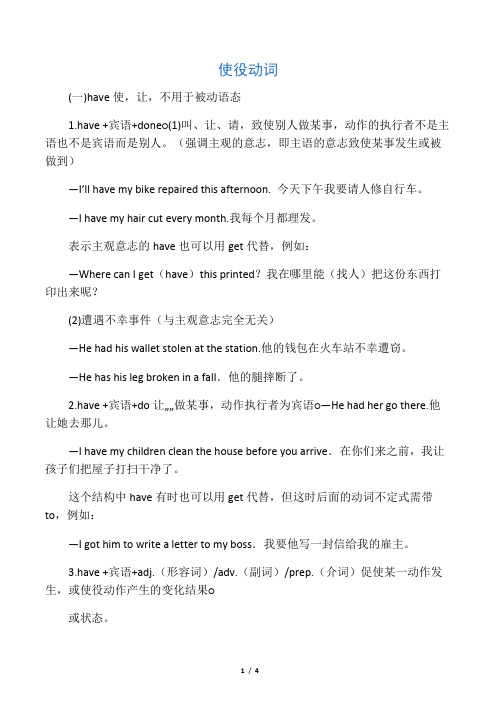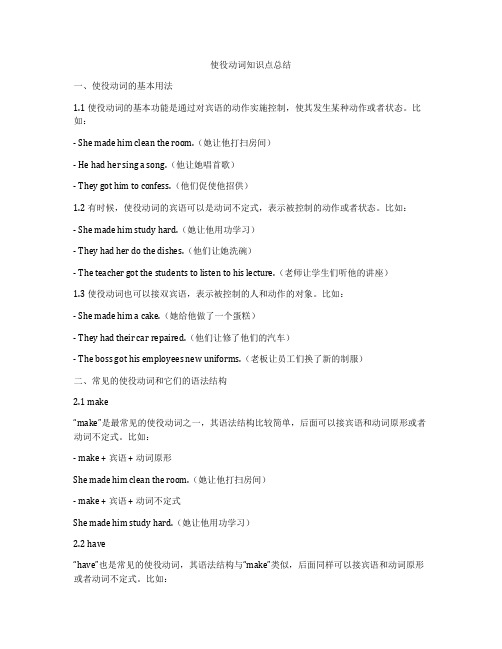初中常考的使役动词的句型及例句
- 格式:docx
- 大小:18.43 KB
- 文档页数:6

使役动词谓语动词
使役动词是指用来表示使别人做某事的动词,常常用在句子的谓语位
置上。
下面是一些常见的使役动词与对应的谓语动词的例子:
1. 让:我让他去买食物。
他让我等了很久。
2. 使:我使他明白了这个问题。
这个困难使他感到沮丧。
3. 引导:我引导她找到了正确的道路。
学生们被老师引导着参观博物馆。
4. 导致:糟糕的天气导致了比赛取消。
这个错误导致了许多麻烦。
5. 带领:领导带领我们走向成功。
他被法官带领进了法庭。
6. 驱使:他的家庭情况驱使他努力工作。
对未来的追求驱使着他前进。
7. 要求:老师要求学生们完成作业。
上司要求员工们加班工作。
以上是使役动词和对应的谓语动词的一些例子。

英语使役动词用法总结英语中的使役动词(Causative Verbs)是用来表示某个人或事物被其他人或事物所控制或支配的动词,通常用于表达某件事情被他人或外界因素所促成或导致。
以下是英语中常见的使役动词及其用法:1. Have:表示某人被他人所控制或支配,例如:I had my car repaired yesterday.(昨天我让人修理了我的车。
)2. Get:表示某人被他人所促成或导致,例如:She got her hair cut at the salon.(她在发廊剪了头发。
)3. Make:表示某人被迫或被控制去做某事,例如:He made me finish my homework before dinner.(他让我在晚餐前完成作业。
)4. Let:表示某人被允许或被授权去做某事,例如:They let me use their computer.(他们允许我使用他们的电脑。
)5. Help:表示某人受到他人的帮助或协助,例如:She helped me with my luggage.(她帮我拿行李。
)6. Have someone do something:表示某人被他人所控制或支配去做某事,例如:I had my assistant finish the report.(我让我的助手完成了报告。
)7. Get someone to do something:表示某人被他人所促成或导致去做某事,例如:I got my friend to help me move.(我让我的朋友帮我搬家。
)8. Make someone do something:表示某人被迫或被控制去做某事,例如:My boss made me work overtime.(我老板让我加班。
)9. Let someone do something:表示某人被允许或被授权去做某事,例如:My parents let me stay out late.(我父母让我晚上出去晚些回家。

初中英语“使役动词”及其用法汇总使役动词是用来表示主语让或者使其他人或者事物做一些动作的动词。
常用的使役动词有:let、make、have、get。
1. let:- 用法一:let后面接宾语或者宾语从句,表示“让人做事”。
- They let us go into the stadium.- My parents let me use their car for the weekend.- 用法二:let后面接不定式,表示“让人做事”。
- Please let me help you with your homework.- She let her children play in the park.2. make:- 用法一:make后面接宾语加原形动词,表示“强迫人做事”。
- My teacher made me stay after school.- The rain made the game get canceled.- 用法二:make后面接宾语加形容词,表示“使人处于其中一种状态”。
- The loud noise made me very nervous.3. have:- 用法一:have后面接宾语加原形动词,表示“让人做事”。
- She had her hair cut at a salon.- 用法二:have后面接宾语加现在分词,表示“使人处于其中一种状态”。
- I have my friends waiting for me outside.- She had her car repaired by a mechanic.4. get:- 用法一:get后面接宾语加过去分词,表示“让人做事”。
- She got her husband to fix the leaky faucet.- I got my hair cut yesterday.- 用法二:get后面接宾语加形容词,表示“使人处于其中一种状态”。

使役动词(一)have使,让,不用于被动语态1.have +宾语+done○(1)叫、让、请,致使别人做某事,动作的执行者不是主语也不是宾语而是别人。
(强调主观的意志,即主语的意志致使某事发生或被做到)—I’ll have my bike repaired this afternoon. 今天下午我要请人修自行车。
—I have my hair cut every month.我每个月都理发。
表示主观意志的have也可以用get代替,例如:—Where can I get(have)this printed?我在哪里能(找人)把这份东西打印出来呢?(2)遭遇不幸事件(与主观意志完全无关)—He had his wallet stolen at the station.他的钱包在火车站不幸遭窃。
—He has his leg broken in a fall.他的腿摔断了。
2.have +宾语+do让……做某事,动作执行者为宾语○—He had her go there.他让她去那儿。
—I have my children clean the house before you arrive.在你们来之前,我让孩子们把屋子打扫干净了。
这个结构中have有时也可以用get代替,但这时后面的动词不定式需带to,例如:—I got him to write a letter to my boss.我要他写一封信给我的雇主。
3.have +宾语+adj.(形容词)/adv.(副词)/prep.(介词)促使某一动作发生,或使役动作产生的变化结果○或状态。
—Please have your money ready.请准备好钱。
4.have +宾语+doing让……持续做某事,或处于某种状态。
动作执行者为句子宾语,但动词必须为持续性○动词,后面常接时间段。
—He had her standing in the rain for two hours.他让她在雨中站了两个小时。

使役动词使役动词1.使役动词是表示使、令、让、帮、叫等意义的不完全及物动词,主要有leave.get.keep.make(使,令), let(让), help(帮助), have(有;让;从事;允许;拿)等。
2.使役动词后接受词,再接原形不定词作受词补语。
接宾语时,人称代词用宾格。
He made me(宾格) laugh.他使我发笑。
I let him go.我让他走开。
I helped him repair the car.我帮他修理汽车。
Please have him come here.请叫他到这里来。
3.使役动词还可以接过去分词作受词补语。
I have my hair cut every month.我每个月理发。
4.使役动词的被动语态的受词补语用不定词,不用原形不定词。
(主)He made me laugh.他使我笑了。
(被)I was made to laugh by him.我被他逗笑了。
使役动词有以下用法:a. have somebody do sth让某人去做某事I had him arrange for a car.b. have somebody doing sth.让某人持续做某事。
He had us laughing all through lunch.注意:用于否定名时,表示“允许”i won't have you running around in the house.我不允许你在家里到处乱跑。
小议“使役动词”的用法1. have sb do让某人干某事e.g:What would you have me do?have sb/sth doing 让某人或某事处于某种状态,听任e.g: I won't have women working in our company.The two cheats had the light burning all night long.have sth done让别人干某事,遭受到e.g:you 'd better have your teeth pulled out.He had his pocket picked.notes: "done"这个动作不是主语发出来的。

使役动词知识点总结一、使役动词的基本用法1.1 使役动词的基本功能是通过对宾语的动作实施控制,使其发生某种动作或者状态。
比如:- She made him clean the room.(她让他打扫房间)- He had her sing a song.(他让她唱首歌)- They got him to confess.(他们促使他招供)1.2 有时候,使役动词的宾语可以是动词不定式,表示被控制的动作或者状态。
比如:- She made him study hard.(她让他用功学习)- They had her do the dishes.(他们让她洗碗)- The teacher got the students to listen to his lecture.(老师让学生们听他的讲座)1.3 使役动词也可以接双宾语,表示被控制的人和动作的对象。
比如:- She made him a cake.(她给他做了一个蛋糕)- They had their car repaired.(他们让修了他们的汽车)- The boss got his employees new uniforms.(老板让员工们换了新的制服)二、常见的使役动词和它们的语法结构2.1 make“make”是最常见的使役动词之一,其语法结构比较简单,后面可以接宾语和动词原形或者动词不定式。
比如:- make + 宾语 + 动词原形She made him clean the room.(她让他打扫房间)- make + 宾语 + 动词不定式She made him study hard.(她让他用功学习)2.2 have“have”也是常见的使役动词,其语法结构与“make”类似,后面同样可以接宾语和动词原形或者动词不定式。
比如:- have + 宾语 + 动词原形He had her sing a song.(他让她唱首歌)- have + 宾语 + 动词不定式They had her do the dishes.(他们让她洗碗)2.3 get“get”同样可以表示使役的意思,其语法结构也和“make”、“have”类似。
中考英语使役动词及其用法全汇总使役动词是指用来表示主语使他人做事的动词。
以下是常用的中考英语使役动词及其用法的全汇总:1. Let:让- Let someone do something:让人做事- Let someone do something:不让人做事- My parents don't let me stay out late at night.- Let someone know:告诉人- Please let me know if you need any help.2. Make:使- Make someone do something:使人做事- His strict parents made him study hard.- Make something happen:使事发生- The strong wind made the tree fall down.3. Have:让,使- Have someone do something:让人做事- I had my sister clean my room.- Have something done:找人做事- I had my car repaired yesterday.4. Get:让,使- Get someone to do something:让人做事- Get something done:找人做事- I need to get my hair cut.5. Help:帮助- Help someone do something:帮助人做事- Can you help me open the door?- Help someone with something:帮助人做事- I need help with my homework.6. Ask:请求,要求- Ask someone to do something:请求人做事- I asked my teacher to explain the problem to me.。
感谢百度文库让我们在这里与你相见,您的下载就是我们最大的动力。
常用使役动词
一、常用使役动词有哪些呢?
使役动词就是表示使、令、让、帮、叫等意义的不完全及物动词,下面就给你唠唠那些常见的使役动词哈。
像“make”,这可是个很常用的使役动词哦。
比如说“make sb. do sth.”,就像“Our teacher makes us study hard.”(我们的老师让我们努力学习)。
它还有“使……成为”的意思呢,例如“The news made him sad.”(这个消息使他难过)。
“let”也是个小明星使役动词啦。
“let sb. do sth.”的用法很常见,就像“Let me help you.”(让我来帮助你)。
“have”也能当使役动词用哦。
例如“have sb. do sth.”,像“I'll have my brother clean the room.”(我会让我弟弟打扫房间)。
不过“have”还有其他的意思,在当使役动词的时候可别搞混啦。
还有“get”这个词,它当使役动词的时候,常见的用法是“get sb. to do sth.”,比如说“My mother gets me to wash my hands befo re dinner.”(我妈妈让我饭前洗手)。
这些使役动词在日常的英语表达里可太重要啦,就像一个个小魔法棒,能让句子变得丰富多彩的呢。
第 1 页共 1 页。
使役动词是指用来表达让别人做某事的动词,包括了“让、使、叫、令、请、劝、命令、要求、教、指示”等。
在英语中,这些动词的用法有着一定的规律和技巧。
以下是10个常见的使役动词及其用法:Let:表示允许或让某人做某事,后接动词原形。
例如:“Let me help you.”(让我来帮你。
)Make:表示强迫或迫使某人做某事,后接动词原形。
例如:“She made me clean the room.”(她让我打扫房间。
)Have:表示让或要求某人做某事,后接动词原形。
例如:“I had him fix my car.”(我让他修我的车。
)Get:表示让或促使某人做某事,后接动词原形。
例如:“I can't get him to listen to me.”(我无法让他听我的话。
)Allow:表示允许某人做某事,后接动词原形。
例如:“My boss doesn't allow smoking in the office.”(我的老板不允许在办公室里抽烟。
)Require:表示要求或需要某人做某事,后接动词原形。
例如:“This job requires you to have a col lege degree.”(这份工作需要你拥有大学学位。
)Ask:表示请求或邀请某人做某事,后接动词原形。
例如:“I asked him to come to the party with me.”(我邀请他和我一起去参加派对。
)Tell:表示命令或告诉某人做某事,后接动词原形。
例如:“My boss told me to finish the report by Friday.”(我的老板命令我在周五之前完成报告。
)Advise:表示建议或劝告某人做某事,后接动词原形。
例如:“My docto r advised me to quit smoking.”(我的医生建议我戒烟。
)Teach:表示教导或训练某人做某事,后接动词原形。
初中英语“使役动词”及其用法汇总1. make:- make + 宾语 + 动词原形:使人做事- make + 宾语 + 形容词:使人感到其中一种情绪或状态- make + 宾语 + 名词:使人成为其中一种身份或角色例句:- My mother made me clean my room.(妈妈让我打扫房间)- The movie made me cry.(这部电影让我哭了)- The teacher made him the monitor.(老师让他当班长)2. let:- let + 宾语 + 动词原形:让人做事- let + 宾语 + 名词:让人成为其中一种身份或角色例句:- My parents let me go to the party.(我父母让我去参加晚会)- The coach let him join the team.(教练让他加入球队)3. have:- have + 宾语 + 动词过去分词:让人做事- have + 宾语 + 形容词:使人拥有其中一种特征或性质例句:- They had me finish the report by tomorrow.(他们让我明天之前完成报告)- His success had the whole family proud.(他的成功使全家都感到骄傲)4. get:- get + 宾语 + 动词原形:让人做事- get + 宾语 + 形容词:使人处于其中一种状态例句:- I got him to help me with my homework.(我让他帮我做作业)- The cold weather got me sick.(寒冷的天气让我生病了)5. help:- help + 宾语 + 动词原形:帮助人做事例句:。
初中常考的使役动词的句型及例句
英语中具有使役意义的动词较多,跟人们常常说的使役动词不是一个概念。
通常我们说使役动词,指的是make, have, let这三个动词,它们在后接不定式作宾语补足语时要省去不定式符号to。
但具有使役意义的动词数量上远不止这些,用法也较灵活,现将其分类叙述如下,请同学们认真识记。
一
使役动词have, let, make (常用于复合结构)
1. have的用法
1)have +宾语+do(省略to的不定式):表示主语“要”“使”“让”宾语干某事,宾语和宾补之间是一种主动关系。
The rich lady had the singer eat with her servants.
这位富有的女士让这位歌手和她的仆人一起吃饭。
I will have him come and help you.
我会让他来帮助你的。
2)have+宾语+现在分词:表示让某人或物连续进行某动作或处于某状态中,宾语和宾补是一种主动关系。
The two cheats had the lights burning all night long.
这两个骗子让灯整晚亮着。
He had us waiting for him three hours yesterday.
昨天他让我们一直等了他三个小时。
I have them all talking to each other in English.
我鼓励他们用英语交谈。
3)have +宾语+过去分词:表示主语的主观意志,即主语让别人为自己完成某事,宾语和宾补是动宾关系,还可以表示主语遭受到来利或不测的事。
Tom said he had had his TV set repaired.
汤姆修了他的电视机。
(别人修的)
Tom had his wallet stolen on the bus yesterday.
昨天汤姆使他的钱包被偷了。
(别人偷的)
4)have+宾语+形容词/副词/介词短语作宾补
Please have your tickets ready.
请准备好你的票。
The Emperor had nothing on.
这位皇帝什么都没在做。
I am sure I’ll have him in the argument.
我确信我会说服他参加辩论。
2. let的用法
1)let +宾语+do(省to不定式):表示主语“要”“使”“让”宾语干某事,宾语和宾补之间是一种主动关系。
Let them stay in the classroom and do their exercises themselves. 让他们自己待在教室里做练习吧。
Let AB be equal to CD.
假设AB等于CD.
2)let+宾语+副词/介词短语作宾补
Let me in and let them out.
让我进来,让他们出去。
Who let you into the building?
谁让你进到大楼里来的?
3. make的用法
1)make +宾语+do(省to不定式):表示主语“要”“使”“让”宾语干某事,宾语和宾补之间是一种主动关系。
此结构常用被动结构。
The teacher made the naughty boy stand there for an hour.
老师让这个调皮的男孩在那里站了一个小时。
The naughty boy was made to stand there for an hour.
这个调皮的男孩被让在那站了一个小时。
2)make+宾语+过去分词,此结构中的宾语指人时常用到反身代词。
He raised his voice to make himself heard.
他提高嗓音让自己被听到。
They will make an important plan known to the public soon.
他们不久就会让公众知道这个计划。
3)make+宾语+形容词,宾语亦可是从句。
The news made her happy.
这个消息使她快乐。
He made it clear that he objected to the proposal.
他明确表明他反对这个建议。
二
使役意义状态动词get, leave, set, send, keep, drive, etc.常用于复合结构中
1. get:使成为/变得某种状态或结果。
I can’t get the old radio to work.
我无法让那旧收音机工作起来。
(接带to不定式作宾补)
Can you really get that old car going again?
你真能让那旧车运转起来吗?
The farmer got his planting done before the rain came.
那农民在雨季前完成了种植。
He got his wrist broken.
他折断了手腕。
(主语发生了不幸的事)
She soon got the children ready for school.
她迅速使孩子们做好了上学准备。
2. leave:使保持/处于某种状态
Leave your hat and coat in the hall.
把帽子和外套放在大厅里。
Did you leave the doors and windows firmly fastened?
你把门窗紧紧锁上了吗?
Always leave things where you can find them again.
总应把东西放在能再次找到的地方。
Who left that window open?
谁让窗户开着?
Don’t leave him waiting outside in the rain.
别让他在外面雨中等待。
Leave somebody / something alone.
不要干涉某人或某事。
3. set:使某人或某物处于或达到某种特殊的状态或关系
set somebody at his ease 使某人安逸/舒适/心情放松
set something in order 使某物井然有序
set somebody free / at liberty 使某人获得自由,释放(犯人等)
It’s time we set the machine going. 是我们发动机器的时候了。
The news set me thinking. 这消息使我陷入了沉思。
He set the farm laborer to chop wood. 他让农场工人去砍伐木材。
I have set myself to finish the job by the end of May. 我决心于五月底前完成那工作。
set a thief to catch a thief. 以毒攻毒;令贼捉贼
4. send:使某人或某物急剧地移动
The earthquake sent the crockery and cutlery crashing to the ground. 地震将杯盘刀叉震落在地上。
Mind how you go----you nearly sent me flying. 小心点,你差点将我撞飞了.
Send that fellow about his business / packing. 叫那家伙滚蛋. The good harvest sent the prices down. 丰收使物价下跌.
5. drive:使某人处于某状态,迫使某人做某事
Failure drove him to despair / desperation. 失败使他绝望。
You’ll drive me mad / to my wits’end. 你会把我气疯的。
/ 你会使我穷尽应付的。
Hunger drove him to steal. = He was driven by hunger to steal.他为饥饿所迫而偷窃。
6. keep:使某人或某物保持某种状态
You should keep the children quiet. 你要使孩子们静下来。
The cold weather kept us indoors. 寒冷的天气使我们待在家里。
If your hands are cold, keep them in your pockets. 如果你手冷,把它们放在口袋里。
Will they keep me in prison / custody. 他们会监禁/拘留我吗?
I’m sorry I’ve kept you waiting. 很报歉让你久等了。
The doctors managed to keep me going. 医生们设法让我活下去。